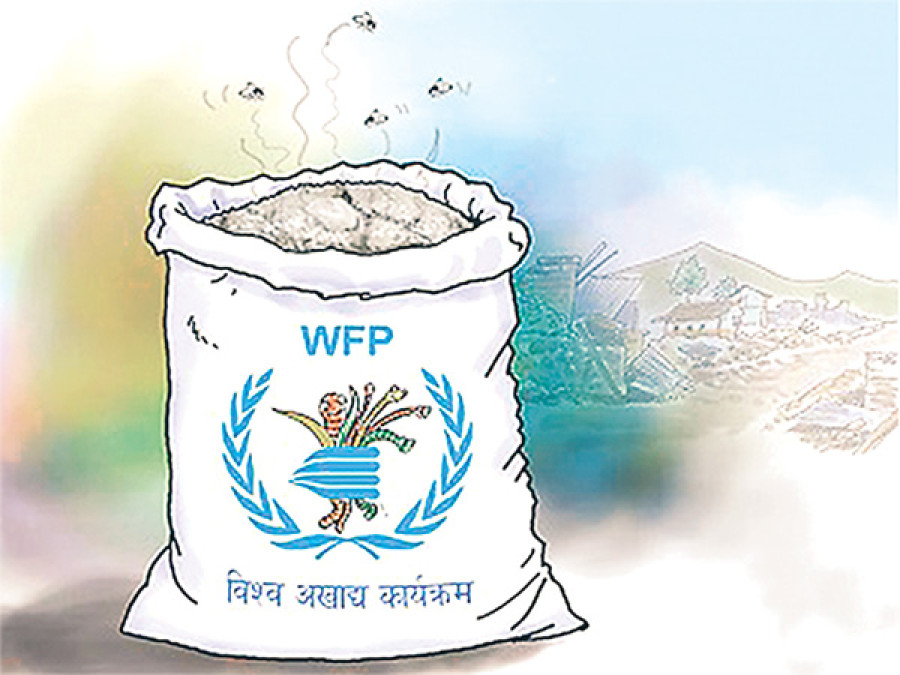Opinion
Help gone wrong
The government of Nepal is equally responsible for the distribution of substandard food by the World Food Programme
Prakash Budha Magar
This situation reveals a huge gap in the understanding, implementation and enforcement of international human rights law.
Still defiant
Millions of people all over the world believe that UN is capable of resolving their problems. Nevertheless, the UN has failed to meet people’s expectations quite a few times. In Nepal, for instance numerous criticisms have mounted against the WFP for distributing substandard, rotten and inedible food in various remote parts of the country. In August 2009, WFP was found to have distributed rotten rice in Jajarkot. Several similar accusations against the WFP have surfaced in the aftermath of the quake in Gorkha and Kavrepalanchok. On June 21, Kantipur reported that the Management and Monitoring Committee of the Legislature Parliament found 514 tonnes of rotten pulses at a WFP storage facility during inspection at Khajura in Nepalgunj. Sadly, despite nationwide condemnation, the WFP is still seen as being defensive and failing to cooperate with government agencies.
Nepal is vulnerable to food insecurity even under normal circumstances. In addition, the earthquake has created serious food shortages. In this situation, the WFP has probably left no stone unturned to fill these gaps for which Nepali citizens must thank the organisation and its staff.
However, when humanitarian agencies such as the WFP fail to comply/fulfil/deliver its goals and objectives, how are we to perceive their role and support? How are we to comprehend the WFP’s failure to stick to its standards at a time when thousands of people in Nepal are deprived of food after the quake? How can we be assured that the Nepali government is protecting its people?
Duty to protect
Nepal mentions food security as a fundamental human right in its Interim Constitution 2007. Likewise, Nepal has agreed and signed numerous international commitments (both legally binding and non-binding) for the protecting various rights of its citizens; for instance, Paris Declaration on Aid Effectiveness and International Covenant for Economic, Social and Cultural Rights (ICESCR). The Covenant assigns a duty to every government, representing the Nepali state, to protect and fulfil the rights of everyone to an adequate standard of living, including the right to adequate food. ‘To fulfil’ implies that the state has a legal obligation ‘to take steps, individually and through international assistance and co-operation’ to secure the right to adequate food. While, ‘to protect’ means that the Nepali state is obligated to protect its citizens from attempts and real violations of the right to food committed by third parties, understood as non-state actors, whether they are companies, NGOs, academia or even international organisations such as the WFP.
The group of experts who monitored all states’ compliance with the ICESCR has stated in one of its general comments that the right to food means availability of food both in terms of quantity and quality, for example, food free from adverse substances and acceptable within a given culture.
Sharing the blame
In the case of WFP fiasco, the Nepali government should also be held accountable along with the WFP as it failed to fulfil its duty to protect its citizens from the wrongdoings of a powerful international organisation. This conclusion is based on the fact that legal obligations of non-state actors can be derived from customary international law. In its advisory opinion, the International Court of Justice has declared the UN and its agencies as entities with international rights and obligations under the general international law.
If Nepal wants to portray itself as a defender of human rights, it must act promptly. At the end of the day, someone must take responsibility for what is happening and guarantee that similar incidents will not be repeated in the future. As a citizen of Nepal, we have the right to be protected from the violation of our rights. One way I see forward is to summon Special Rapporteur on right to food to investigate WFP’s involvement in the scandal and give advice accordingly.
Budha Magar is a graduate from the University of Essex, the UK




 9.6°C Kathmandu
9.6°C Kathmandu










